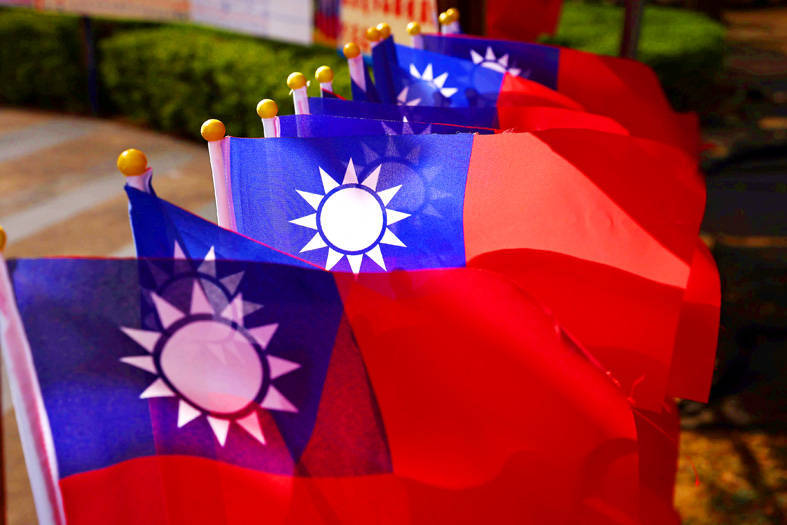Taiwanese flags fly at a square ahead of the Double Ten National Day celebrations in Taoyuan on Oct. 8, 2021. Photo: Ann Wang, Reuters
'BETTER PREPARED': Taiwan is pressing ahead with plans to make sure its military has highly mobile weapons, such as Javelin missiles, Taipei's envoy to the US said
/ AP, WASHINGTON
Beijing has no right to decide or define how Taiwan engages with the world, Representative to the US Hsiao Bi-khim (Xiao Meiqin) said in an interview with The Associated Press on Friday.
The interview came after a year of higher tensions with China, including China launching ballistic missiles over Taiwan and temporarily suspending most dialogue with the US after then-US House of Representatives speaker Nancy Pelosi visited Taiwan in August.
Asked if new US House Speaker Kevin McCarthy should make good on his earlier pledge to visit Taiwan as well, Hsiao said. “That will be his decision. But I think ultimately the people of Taiwan have welcomed visitors from around the world.”
Beijing's leadership “has no right to decide or define how we engage with the world,” she added.
Hsiao spoke at Twin Oaks, the more than 130-year-old hilltop mansion that Taiwan uses for official functions in Washington. She talked on a range of Taiwan-US military, diplomacy and trade relations issues shaped by intensifying rivalries with China.
No Taiwanese flag flew over the building, reflecting Taiwan's in-between status as a US ally that nonetheless lacks full US diplomatic recognition. The US withdrew that in 1979, on the same day it recognized Beijing as the sole government of China.
In Washington, Taiwan's self-rule is one issue that has strong support from both parties.
US administrations for decades have maintained a policy of leaving unsaid whether the US military would come to Taiwan's defense if China did invade.
China's military shows of force after Pelosi's visit had some in the US Congress suggesting it was time for the US to abandon that policy, known as “strategic ambiguity,” and to instead make clear Americans would fight alongside Taiwan.
Asked about those calls on Friday, Hsiao only praised the existing policy.
“It has preserved the status quo for decades, or I should say it has preserved peace,” she said.
US President Joe Biden has repeatedly volunteered in public comments that the US would come to Taiwan's defense, only to have aids walk that back with assurances that strategic ambiguity still prevails.
Meanwhile, after watching the Ukrainians' successful hard-scrabble defense against invading Russian forces, Taiwan realizes it needs to load up on Javelins, Stingers, High Mobility Artillery Rocket Systems and other small, mobile weapons systems, Hsiao said.
The Taiwanese and Americans have reached agreement on some of those, she said.
Taiwan is pushing to make sure that a shift to grittier, lower-tech weapon supplies for Taiwanese ground forces “happens as soon as possible,” Hsiao said.
Even with the US and other allies pouring billions of dollars of such weapons into Ukraine for the active fight there, training global arms stocks, “we are assured by our friends in the United States that Taiwan is a very important priority,” she said.
Taiwan has learned important lessons from Ukraine's war that would help it deter any attack by China or defend itself if invaded, she said.
Among the lessons: Do more to prepare military reservists and also civilians for the kind of all-of-society fight that Ukrainians are waging against Russia.
"Everything we're doing now is to prevent the pain and suffering of the tragedy of Ukraine from being repeated in our scenario in Taiwan," she said. "So ultimately, we seek to deter the use of military force. But in a worst -case scenario, we understand that we have to be better prepared.”
Ukraine's experience has had lessons for the US and other allies as well, she said, including the importance of a united allied stand behind threatened democracies.
"It's critical to send a consistent message to the authoritarian leaders that force is never an option ... force will be met by a strong international response, including consequences," Hsiao said.
Hsiao would not directly address a report by Nikkei Asia on Friday that US National Guard members had begun work training in Taiwan, saying only that Taiwan was exploring ways to work with the guard members to improve training.
News source: TAIPEI TIMES
Representative to the US Hsiao Bi-khim speaks during an interview with The Associated Press in Washington on Friday. Photo: AP
